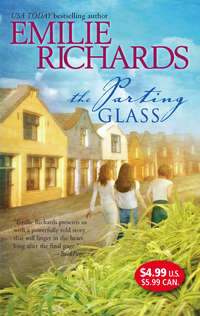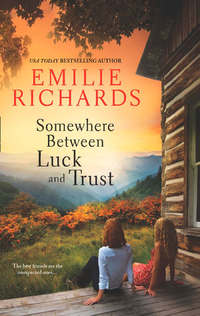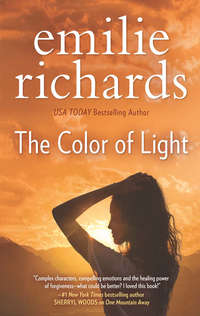
Полная версия
Rising Tides
“She thought she had little choice.”
“But that’s impossible to believe. She was a devoted mother. She would have given up her life at a moment’s notice for her children.”
“She gave Nicky to Raphael, then she set about re storing the fortunes of Gulf Coast Steamship. Only there were no steamships by the time the creditors had finished with them. Raphael had done his work well. So the company became simply Gulf Coast Shipping. And when she couldn’t find any other way to get it back on firm financial footing, she married Henry Gerritsen, a man who could help her do it.”
Dawn was silent, trying to drink in the entire story. Part of her wanted to tell Phillip he was crazy. But a bigger part, a much bigger part, knew he was telling the truth. Everything added up. His presence here. Nicky’s presence here. And the bits and pieces of history that she’d always known. “Did Grandmère ever see Nicky again? Did she know anything about her when she was growing up?” she asked at last.
“There’s a lot more to this than I’ve told you. And that’s why your grandmother had me write it all down. Aurore initialed every page.” He smiled, with no humor. “She knew there would be some here who wouldn’t believe it.”
“You mean you have this manuscript here with you?”
“No. Spencer has copies to give everyone, but apparently not until this little beach party is completed.”
“Does Spencer—”
“Spencer can verify everything I’ve told you. He’s known the entire story for many years. And so has Pelichere.”
The sun had risen higher before she spoke again. “I’m going to have to tell my parents, Phillip. How are you going to tell Nicky?”
“Maybe I should have told her months ago. Aurore left it up to me to decide when.”
“Why didn’t you tell her before Grandmère died? They might have had a chance at a reunion.”
“That’s why I didn’t. I was afraid that nothing good could come of a meeting. I couldn’t bear to see either of them hurt more.” He slid off the car and stood. “There’s more than I’ve told you. Don’t judge my decision until you know it all.”
She joined him on the ground and took his arm when it seemed as if he was going to walk away. “Thanks. I guess.”
“For what? For telling family secrets you’d probably rather not have heard?”
She tried to think of a way to explain her own con fused feelings. “I’ve spent the last year of my life trying not to be a part of this family.”
He moved away. “Well, now there’s even more family that you can try not to be a part of. And not the kind you’re probably dying to have.”
She let that go. “Listen, have you ever stood on the Mississippi River bank when the fog was rolling in?”
He frowned.
“Try it sometime,” she said. “I did it a lot as a little girl, and I still remember. At first the fog is appealing, soft and cool and deliciously mysterious. Then you begin to realize there are people nearby, and boats on the river. You hear snatches of conversation, whistles and bells, and sometimes you even hear laughter. But nothing is clear, and you can’t find anyone or anything without falling into the river and drowning.”
“So?”
“Well, that’s what it’s been like growing up as a Gerritsen,” she said. “And even though I don’t like what I’ve heard about my grandmother, I guess I’m grateful you’re here to chase off the fog.”
His eyes searched hers, as if he expected to see some thing there to contradict her words. Then he shrugged. “There won’t be any fog at all by the time we’ve finished here, Dawn. Our grandmother’s going to see to that. I really hope you’re ready to see the whole picture. But I can tell you this. By the time these four days have ended, you may wish for fog again with all your heart.”
CHAPTER SIX
“Lies.” Ferris slashed his hand through empty air. “What kind of game are you playing, Dawn?”
Dawn had waited until her parents were awake and dressed; then she had invited them both for a walk down the driveway, where she quietly related what she’d learned from Phillip. No one else was in sight.
“No games,” she assured Ferris. “I’m just telling you what I know.”
“You’re telling me what Phillip Benedict told you.”
“That’s part of it. But I’ve read the letters, and Phillip’s story fits.”
“You believe it?” Ferris demanded. “You’re that gullible?”
“Grandmère dictated the story to him, and Phillip says that Spencer and Pelichere can verify everything he told me. You can ask them.” Dawn didn’t step back as her father moved in on her, but she felt as threatened as she had on the rare occasions in her childhood when Ferris had been angry at her.
“I told you Nicky Valentine was a liar. Apparently she’s passed it on to her son. Don’t you know she’ll jump at the chance to turn this into a scandal?”
Dawn was beginning to get angry right along with him. “Don’t kid yourself, Daddy. Nicky doesn’t want to be related to you any more than you want to be related to her. Her reputation will suffer.”
“I think the two of you have said enough for now.” Cappy stepped between them. “Dawn, Pelichere made French toast this morning. Why don’t you go inside and get some before Spencer calls us all together?”
“When does this family reach the point where any two of us can have a conversation without a referee?” Dawn watched something—acknowledgment, perhaps, or possibly even sadness—pass over her mother’s face. Then, before she could identify it for certain and be disappointed, she turned back up the driveway and left them behind her.
“It’s a lie,” Ferris said when Dawn was gone. “An insidious lie. I won’t have my mother’s name destroyed this way.”
“Your mother’s name?” Cappy gave a humorless laugh. “Nobody’s out here except you and me, Ferris, and both of us know whose name you’re worried about.”
“Don’t you start on me. You’ll be tarred with the same brush if these lies are spread around.”
Cappy made a show of looking at her watch. “We’ve got forty minutes before we’re all supposed to get together again. I’m going for a walk along the beach. I’d suggest you use the time left to figure out how you’re going to come to terms with the fact that Nicky Valentine is your sister.”
“I don’t know what these Gerritsens are trying to do, but I don’t see why I have to stay here and play along.” Nicky glimpsed Phillip and Jake exchanging looks as she stalked to the closet. She had been so quiet as Phillip related the story of her birth that she guessed neither man had expected this response.
As she began to pull clothes off hangers, Phillip stepped toward her, but Jake put his hand on his step son’s arm and nodded toward the door. Phillip stood poised between what he thought he should do and what he obviously preferred. Finally he settled for the latter. The door closed softly behind him.
“What do you think you’re doing?” Jake asked.
“I’m going home.”
“You gonna drive all the way back by yourself in this rain?”
She faced him. “You’re not planning to stay?”
“I’m not leaving. You don’t stay to find out what’s going on, I have to.” Jake sat down on the bed. “The way I see it, someone’s lying, or someone’s telling the truth. Either way, we got to ask ourselves why. We can’t pre tend it doesn’t matter.”
“Aurore Gerritsen was not my mother.” The bed was soft against Nicky’s legs. She felt Jake’s hand on her knee and realized she was sitting beside him.
“What do you remember about your daddy?” Jake asked.
“Little things. He was a good man.”
“And what did he tell you about your mother?”
“Nothing. He never said anything.”
“Could she have been a white woman?”
“How would I know what color she was?”
“Because you can put two and two together same as any reasonably well-educated person.”
“We’re talking shades? I’m supposed to guess my mother’s race by my father’s color? By mine? We’re not mixing a pitcher of chocolate milk here. Add a little more Hershey’s syrup, make it a little darker. People aren’t that simple, and you know it.”
“Your daddy didn’t tell you anything about your mama? Did anybody else?”
She was silent for a long time, wrestling with the things she couldn’t forget, wrestling with something too terrible to remember. “The place where I grew up was full of women as light or lighter than me, and all of them had colored blood. I always thought my mother had been one of them. Someone told me she’d died giving birth to me.”
“But it’s possible she could have been white?”
“No! Aurore Gerritsen was not my mother. There’s something wrong here.”
“Then stay and find out what it is.”
She stood and walked to the window. Dawn had been right. Nicky could see the Gulf. Now the waves were angry, and the water was a dark seaweed green. She thought of Phillip’s story, of a small boy and girl caught up in the water’s fury, of a woman screaming as her lover cut the thin tether that anchored her to the future.
She covered her ears. “I hate this place! How can you even think about staying? We weren’t welcome yester day, and we’ll be less so now. Once Ferris Gerritsen finds out what Phillip is saying, he’ll come after us with everything he’s got.”
“I’ll be looking forward to that.”
She faced him. “You think anybody in this state would take your side in a fight with the almighty senator?”
“I spent the first part of my life running from who I was, and the second part making peace with it. I plan to spend the last part standing up for what’s mine. You going to stand with me?”
“You’re not my conscience, Jake. If I stay, I stay be cause it’s right for me. For me!”
“I know. I’m just asking you to take a little time to let it all settle.”
“Give me some time alone before I have to face everybody again.”
He left quietly. He had been gone for a long time be fore Nicky was calm enough to think about her surroundings. The room was airy and feminine, decorated in a casual beach-house style with which she felt completely comfortable. Aurore Gerritsen no longer seemed a stranger. She had left her personal stamp everywhere. Nicky stood in the bedroom of the woman who had reached from the grave, claiming to be her mother, and she cursed Aurore for ever having been born.
Nicky didn’t look right or left. She held out her hand as Spencer stepped in front of her. Spencer’s wasn’t quite steady as he rested a jeweler’s box in her palm. “Aurore hoped that this might, in some small way, explain a great injustice.”
Nicky didn’t speak, and neither did anyone else.
Ben and Phillip exchanged glances. Phillip had told Ben the truth about Nicky and Aurore, and Ben knew that he had told Dawn, as well. Now, judging from the rigid set of her head, Nicky knew, too.
Nicky’s fingers closed around the box. She stood and left the morning room without a word. Jake followed.
“There’s nothing Aurore could have put in that box or anywhere else that’s going to make this any easier.” Phillip rose from his seat beside Ben and left the room, too.
“Just so you’ll know, we’re finished for the day,” Spencer told the rest of them. “We’ll meet tomorrow at the same time.”
Since he awakened that morning, Ben had wanted to talk to Dawn. He had wanted to talk to her even more after Phillip recounted what had passed between them that morning. But Dawn had eluded him. Now she stood between her parents and Spencer, a willowy guard dog of an old man.
As Ben watched, Cappy took Ferris by the arm and steered him toward the door. Ben was surprised that there hadn’t been another outburst from the senator, but he suspected Ferris was just biding his time. Cappy glanced back at Dawn, but Dawn, who was busy murmuring something to Spencer, didn’t notice. Dawn linked her arm through the old man’s and pointed outside. They walked to the window together, deep in conversation.
Ben knew better than to push her. They would talk when she was ready. She had already made that plain to him. Whatever happened between them now was on Dawn’s terms. He decided to settle for more reading. Perhaps, by the time they did talk, there would be even more to discuss.
Early in the afternoon, Nicky heard the door open and close. She didn’t turn away from the window. Strong arms enveloped her, and she leaned back, into her husband’s strength. “Where’d you go?”
“Pelichere told me about a bar down the road where I’d be welcome.”
She didn’t ask why he’d had to get a recommendation. She doubted it would ever be any different on the island.
He didn’t say anything else. He just tightened his arms and stood quietly looking out the window.
“I’m sorry I asked you to leave,” Nicky said.
“I had some thinking to do.”
“You’re not even curious what was in the box?” she asked.
“Never said I wasn’t curious.”
“You’re a good man, Jake Reynolds.” She bent for ward and lifted something from the nape of her neck and slipped it over her head. “Here.”
He kept her against him with one arm and dangled the necklace with his free hand. “This is it?”
The locket was old gold, mellowed by age and con tact with human skin. Diamond-studded roses were en twined on the front, etched skillfully by a long-dead craftsman. “There’s a picture inside.”
The catch was difficult to open; she could feel him struggling. She took it from him and pressed the edges until it spread into two identical golden hearts.
“Who is it?” Jake asked.
“You tell me.”
“Then it doesn’t mean anything to you?”
“I didn’t say that.” She stared at the picture. It was dearly familiar, although she hadn’t seen it in more than thirty years. “This was mine when I was a little girl,” she said.
“What?”
“Mine, Jake. The locket was given to me by a friend of my mother’s when I still lived in New Orleans, and she put her own picture inside.”
“I don’t understand.”
“Neither do I.”
“If it was yours, why did Aurore Gerritsen have it when she died?”
“That’s another story.”
He didn’t ask her to tell it. He fell silent, but both arms crept around her again.
Nicky felt tears welling up, although she hadn’t cried since opening the box. She snapped the locket shut and slipped it back around her neck. “I need some answers. Will you find Dawn and send her in here?”
“You think she’s going to tell you anything?”
“I’m going on instinct. What else can I do?”
He hugged her hard enough to force the air from her lungs. He always resorted to strength when he was most vulnerable.
She felt the absence of his arms once he’d gone, but she steeled herself for what was to come. She didn’t have to wait long. There was a knock, and Dawn opened the door. “Nicky?”
“Come on in.”
“Jake said—”
“I want you to look at a picture and tell me if you know who it is.”
“Of course.” Dawn approached slowly. “Are you all right?”
“No. Are you?”
“No.”
“Well, we’ve all got that much in common.” Nicky slid her fingers over the locket. She hesitated and looked back up at Dawn. “Have you ever seen this before?”
“I don’t think so.”
Nicky opened the locket. “And this woman?”
Dawn gazed at the photograph for a moment, then at Nicky. “My grandmother when she was young.”
Nicky snapped the locket shut. She turned away.
“Would you like me to leave?” Dawn asked softly.
“She never told me she was my mother. When I was a little girl, your grandmother held me on her lap and brought me presents. She told me she had known my mother, but she never told me who she really was.”
“Oh, God.” Dawn sat down on the bed beside her.
“I saw her twice, I think, although I’m not sure, be cause it was so long ago. I know I saw her right before my father and I left for Chicago, and she gave me this locket.”
“How old were you?”
“Twelve, I think. And that was the last time I ever saw her. Because I didn’t come back to New Orleans until a few years ago. My father was killed in Chicago. An old man named Clarence Valentine saw the whole thing. He was like a grandfather to me, and afterwards he was afraid for my life. He was a jazz pianist, and he was on his way to Paris, to play in a club in Montmartre. So he smuggled me out of the city and took me with him.”
“How was your father killed, or don’t you want to talk about it?”
“There was a riot, black against white. He was gunned down. I got a good look at the face of the man who did it. And Clarence was afraid that because I had, the man might come after me, too. So we left the country, and I started a new life.”
“Clarence Valentine. That’s where the Valentine comes from.”
“What did Phillip tell you about my father?”
Dawn was silent, as if she would rather not say what conclusions she’d drawn.
“Did he tell you that after everything, after my father had ruined Aurore’s family and taken me from her arms, and even after she had married Henry Gerritsen, they still couldn’t forget each other?”
“Raphael and my grandmother?”
“Not Raphael. He called himself Rafe by then. That’s how I remember him. Phillip says that years later Aurore discovered why my father had done the things he had. She found the letters that you read last night, and she figured out the truth. And when she confronted my father, he told her everything. For the first time, she understood it all. And she understood something even more frightening. Despite their years apart, despite everything they had done to hurt each other, he still loved her, and she still loved him.”
Nicky looked up. “Both of them knew how impossible it was. Everything in the world stood between them. But they loved each other anyway. Against all the odds. And that’s why my father took me and left the city. Be cause their love would have doomed them both.”
“I don’t even know what to say,” Dawn said at last.
“Phillip tells me that Aurore believed I died in the riot, along with my father. She was told that I had, and all her investigations seemed to prove that I hadn’t survived. By then I was in Paris, but she didn’t know.”
Nicky stopped. She wondered why she was telling this to Dawn. She turned, not knowing what she would see on Dawn’s face. Dawn lifted her hand and tentatively covered Nicky’s. “I can’t believe that she didn’t love you, Nicky. I knew her, as well as anyone in the world did. And I know that she wouldn’t ever have for gotten her own child or stopped loving you. Maybe she thought she didn’t have any choice, but she must have felt so guilty. The things she did must have stayed with her until the day she died. That’s why she couldn’t tell you herself.”
“No. I know why she couldn’t tell me.”
Dawn was silent. Nicky knew she expected her to go on, but she couldn’t. There were some words too terrible to be spoken out loud. “Thank you,” Nicky said at last. “I needed someone with answers.”
Dawn hesitated, as if she weren’t sure what to do. Then she leaned forward and kissed Nicky’s cheek.
Nicky went to the window again after Dawn left and rested her cheek against the window frame. She was a woman who looked toward the future and rarely considered her past. The future beckoned, but the past had always been a weight around her heart. And still, as hard as she had tried to forget where she had come from and who she had been, it was with her still.
Her hand went to the locket; it was warm against her skin. “I know why you didn’t tell me, Aurore,” she whispered. “How could you have told me, after everything that happened next?”
CHAPTER SEVEN
Paris, 1927
Chez les Américains might as well have been plunked down in the center of the New World, considering how little of its ambience it owed to the Old. Shuttered windows erased all the distinctive qualities of the City of Light, most particularly light itself. Years ago someone had painted the brick interior of the rue Pigalle night club black and stained the soft wood floor. The newest owner, hoping to benefit from wealthy Americans spending cheaply purchased francs, had covered the walls with framed photographs of Valentino and Pick ford and pastoral scenes of western mountains and Indian braves. Illuminated by harsh spotlights, smoke-filled and noisy, Chez les Américains had little to offer the expatriates it so coveted.
But still, they came.
“Sure they come and keep comin’, Nickel girl,” Clarence said, chomping on the end of a huge cigar he wouldn’t light. “They comin’ to hear the best jazz in Paris. Hot jazz, not that pisspot stuff served up ‘round the corner.”
Nicky leaned on the top of the piano and watched as guests wandered from table to table. Clarence wasn’t boasting. Clarence Valentine and his band were the best in town.
Nicky adored Clarence, and had since the first time she heard him play, when she was still a young child. Since then, of course, her life had changed dramatically. She had gone from the child Nicolette Cantrelle to the woman Nicky Valentine, from Chicago to Paris, from a life with her beloved father to a very different one with Clarence. She had left everything behind when she and Clarence were forced to flee Chicago, everything except Clarence himself and her love of music.
And memories of her father’s death that still surfaced sometimes as nightmares.
“What’s you thinkin’ about, Nickel? Your face so long,” Clarence said.
She smiled fondly at him. “Is not!”
His face lit up in a grin. Clarence had made his living hauling bales of cotton on the New Orleans river front in the days before he could get jobs with his music, and he was a large man, although the years had begun to whittle away at him. He had little education, none of it in music, but he had taught himself to play the piano by listening to the music of others. His ear was so fine that he could play any song he heard, and usually a more thrilling version, at that.
Tonight he wore a shiny black suit with a scarlet vest and his signature diamond stickpin in his tie. In the harsh glare of the spotlight, his shirt was white enough to blind her.
“You gonna get to it?” she asked. “Or you gonna flex those old fingers all night?”
“We’ll get goin’ when we need to. Things’ll heat up soon enough.”
Nothing really got started at the Montmartre night clubs until well after midnight. The Americans and British had come to Paris to escape schedules and rules. In the process, they had established a new set.
Their days were predictable, and so were their nights. After dinner at cherished little restaurants, the serious drinkers among them went on to small, intimate bars like the Dingo or Parnasse, where they were on a first-name basis with the barman. But the others drifted to Montmartre for dancing and music. Those who came to Les Américains stayed until well after the sun was up, because as the clock ticked off the hours, the music got hotter and sweeter. The tips got more extravagant, too, and the praise more abandoned, which was why Nicky was preparing to ask Clarence if she could perform at the end of the night, instead of the beginning.
“Speaking of things heating up,” Nicky said, glad that he had given her an opening, “I can sing hot. You just don’t give me a chance, Clarence.”
“What you talkin’ about? You sing every single blessed night. You get everybody in the mood to stay here and listen. Weren’t for you, they wouldn’t come ‘tall.”
“They sure don’t come to hear me.” Nicky picked at a nail.
Clarence ran his fingers down the keyboard and started to play in earnest. She recognized the beginning of a bluesy medley, songs Clarence would consider too provocative for her.
She pouted—something she knew he hated. “They don’t come to hear me, because I never get to show them what I can do.”
“You better go show them now, else Mr. Yernaux’s gonna find himself somebody new for hostess.”
She made a face at him, crossing her eyes à la Josephine Baker, but he only shook his head. She straightened and shimmied to be sure her beaded dress fell into a perfect line; then she pasted a wide smile on her face and started for the door.







